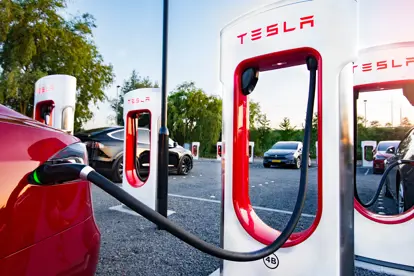
What is kWh and kW in electric car
A Comprehensive Guide for Electric Cars
As the push for sustainable transportation continues to grow, more businesses and individuals are considering switching to electric vehicles (EVs). However, diving into the world of EVs introduces a new language – terms like kWh and kW- crucial for understanding an electric car's performance and efficiency.
Before you decide to lease an electric car, understanding these terms will help you make an informed decision and choose the right vehicle for your needs. This comprehensive guide will delve into what kWh and kW mean and their significance in the context of electric cars.
Fact #1: kW (kilowatts) measures power — it tells you how quickly an EV can use or deliver energy, such as how fast it charges or accelerates.
What are kWh and kW?
Let's start by breaking down these two units of measurement:
-
kWh, or kilowatt-hour, is a unit of energy. It's used to measure the amount of energy that an appliance uses over some time. In the context of electric vehicles, it's typically used to describe the capacity of the car's battery – how much energy it can store.
-
kW, or kilowatt, is a unit of power. It represents the rate at which energy is used or produced. For electric cars, kW is usually used in two contexts: the power output of the motor (how fast the car can use energy to drive) and the charging power (how fast the car's battery can be charged).
kWh in Electric Cars: The Battery Capacity
In electric vehicles, the battery's capacity – its ability to store energy – is measured in kWh. This is analogous to the size of a fuel tank in a petrol or diesel car. The higher the kWh rating, the more energy the battery can store, and generally, the further the vehicle can travel on a single charge.
For example, an electric vehicle with a 40kWh battery can store enough energy to power a 40kW electric motor for one hour. However, the actual range of the vehicle also depends on other factors like the vehicle's efficiency, driving conditions, and driving style.
Understanding the kWh rating of an electric vehicle's battery is crucial when considering leasing an electric car. A larger battery (higher kWh) vehicle may be more suitable for longer journeys or less frequent charging. A smaller battery (lower kWh) could be sufficient for city driving or shorter commutes.

kWh in Electric Cars: The Battery Capacity
In electric vehicles, the battery's capacity – its ability to store energy – is measured in kWh. This is analogous to the size of a fuel tank in a petrol or diesel car. The higher the kWh rating, the more energy the battery can store, and generally, the further the vehicle can travel on a single charge.
For example, an electric vehicle with a 40kWh battery can store enough energy to power a 40kW electric motor for one hour. However, the actual range of the vehicle also depends on other factors like the vehicle's efficiency, driving conditions, and driving style.
Understanding the kWh rating of an electric vehicle's battery is crucial when considering leasing an electric car. A larger battery (higher kWh) vehicle may be more suitable for longer journeys or less frequent charging. A smaller battery (lower kWh) could be sufficient for city driving or shorter commutes.
Fact #2: kWh (kilowatt-hours) measures energy capacity — it indicates how much energy a battery can store, much like the size of a fuel tank in a petrol car.
kW in Electric Cars: Power and Charging
In the context of electric vehicles, kW is most commonly used to describe two things: the power output of the vehicle's motor and the power of the charging station.
Power Output
The power output of an electric motor, measured in kW, tells you how much power the vehicle can produce. This can be considered the electric equivalent of horsepower in a conventional internal combustion engine. The higher the kW rating, the more powerful the vehicle.
This power rating directly impacts the vehicle's performance, including its acceleration and top speed. A higher kW rating will generally mean quicker acceleration and potentially a higher top speed, which might be important factors if you regularly drive on highways or value a sportier driving experience.
Charging Power
When charging an electric vehicle, the kW rating refers to the charging station's power. This is essentially the speed at which the charger can transfer energy into the vehicle's battery.
A higher kW charger can charge an electric vehicle faster, assuming the vehicle's onboard charging system can accept that rate of charge. For example, a 7kW home charging point will charge an EV faster than a standard 3kW charger. Fast chargers, like those found in public charging stations, can have much higher ratings – up to 50kW, 150kW, or even more.
Keep in mind that not all electric vehicles can accept the full
power from high kW chargers due to limitations in their onboard charging systems. Therefore, it's crucial to understand the kW rating of available charging stations and the maximum charging power your potential electric lease vehicle can accept.
Conclusion
Understanding kWh and kW is key to making an informed decision when leasing an electric vehicle. These units give you valuable information about the vehicle's range, performance, and charging requirements, which are all crucial factors in determining if an electric vehicle is the right choice for your needs.
Leasing an electric vehicle is a significant step towards a more sustainable future. If you're considering making this switch, our team at Silverstone Leasing is here to guide you through the process. With various electric vehicles, we can help you find the perfect EV for your needs.
Fact #3: Higher kWh means a longer driving range, while a higher kW charging rate means the car can charge faster (assuming the charger supports it).
Our Latest Leasing Offers
Hear from Our Happy Customers
At Silverstone Leasing, we believe the best way to understand the quality of our service is to hear directly from the people who matter most – our customers. In these short video testimonials, you’ll see real experiences from individuals and businesses who’ve leased with us. From first-time drivers to fleet managers, their stories highlight the care, transparency, and expertise that set us apart.
FAQs: Electric Car Charging
The power output of an electric vehicle's motor, measured in kilowatts (kW), varies widely depending on the model and make of the car. Small, compact EVs may have engines with power outputs of around 50-100 kW. Larger and high-performance electric vehicles, such as Tesla's, can have power outputs exceeding 300 kW. Always check the specifications of the individual model to get accurate figures.
The distance an electric vehicle can travel on 1 kWh of electricity (its energy efficiency) depends on various factors, including the car's weight, aerodynamics, and driving conditions. On average, most electric vehicles can travel between 4 to 6 miles on 1 kWh of electricity. Therefore, a 60 kWh battery car could travel between 240 and 360 miles on a full charge under ideal conditions. However, real-world range often varies due to factors like driving style, terrain, heating or air conditioning use, and more.
In electric vehicles (EVs), the term kWh, or kilowatt-hour, is primarily used to measure the capacity of the car's battery. It indicates the amount of energy the battery can store. This is similar to the size of a fuel tank in a conventional car. The higher the kWh rating of the battery, the more energy it can store, which typically leads to a longer driving range on a single charge.
In the context of an electric car, 100 kW could refer to either the vehicle's motor's power output or a charging station's power.
If it's referring to the motor's power output, 100 kW is a measure of the vehicle's power, similar to horsepower in conventional cars. A 100 kW electric motor is relatively powerful, and you can expect reasonably quick acceleration and an excellent top speed from a car with this power output.
If it's referring to a charging station, a 100 kW charger is a fast charger that can deliver electricity to the vehicle's battery at a high rate. This means the car can be charged more quickly, assuming the vehicle's onboard charging system can accept that charge rate. For example, a car with a 60 kWh battery could theoretically be fully charged from empty in less than an hour using a 100 kW charger. However, in practice, the charging speed slows down as the battery gets closer to full to protect the battery's health.












